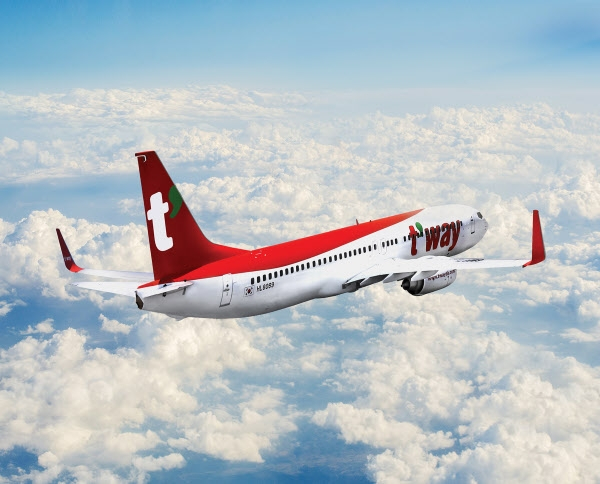Airlines
Korea airlines’ race for Mongolian route intensifies
Budget airline T’way to launch flights between Incheon and Ulaanbaatar on July 6; Jeju Air to start the route on June 29
By Jun 20, 2022 (Gmt+09:00)
2
Min read
Most Read
LG Chem to sell water filter business to Glenwood PE for $692 million


KT&G eyes overseas M&A after rejecting activist fund's offer


Kyobo Life poised to buy Japan’s SBI Group-owned savings bank


StockX in merger talks with Naver’s online reseller Kream


Meritz backs half of ex-manager’s $210 mn hedge fund



South Korean airlines’ competition for the Mongolian route, one of the most profitable, is heating up as low-cost carriers have joined the race, which will likely bring down ticket prices.
T'way Air Co., a budget airline, said on Monday it plans to launch a flight between South Korea's hub airport of Incheon and Ulaanbaatar for the summer peak season from July 6 to September. Its local competitor Jeju Air Co. is scheduled to begin service on the route on June 29.
Currently, the country’s two full-service airlines -- Korean Air Lines Co. and Asiana Airlines Inc.-- are operating the route, while another carrier LCC Air Busan Co. has been running a route from Busan, South Korea’s second-largest city, and the Mongolian capital.
“Ticket prices fell about 10% in 2019 when Asiana won traffic rights (for flights between the two countries), so more flights will further reduce prices,” said an LCC source.
South Koreans do not need a visa to visit Mongolia, nor does the country require COVID-19 vaccinations for entry.
INTENSIFYING COMPETITION
Flights between South Korea and Mongolia are very profitable for airlines. Ticket prices are triple or quadruple those for the Incheon-Hong Kong route of similar distance, while occupancy rates stay around 80-90% on strong demand not only from tourists but also students and businesspersons. Occupancy rates do not usually fall even during the off-season, industry sources said.
South Korean airlines have been competing to win routes for Mongolia.
The country’s top carrier Korean Air had been dominating the market until 2019 when the countries agreed to increase the number of flights. Asiana secured traffic rights for flights between the nations at that time.
In 2021, the two countries decided to further expand the number of flights. In April of last year, Jeju Air and T’way won the rights to operate four and three flights a week, respectively, from June to September 2022. Jin Air Co., Korean Air’s LCC unit, failed to obtain any of the traffic rights.
Another LCC industry source hoped for more flight increases.
“Once the new flights prove strong demand for the Mongolian route, we will see more positive results from the next aviation talks,” said the source.
Write to Jeong Min Nam at peux@hankyung.com
Jongwoo Cheon edited this article.
More to Read
-

-
 Korean chipmakersSamsung in talks to supply customized HBM4 to Nvidia, Broadcom, Google
Korean chipmakersSamsung in talks to supply customized HBM4 to Nvidia, Broadcom, Google20 HOURS AGO
-
 EnergyLS Cable breaks ground on $681 mn underwater cable plant in Chesapeake
EnergyLS Cable breaks ground on $681 mn underwater cable plant in ChesapeakeApr 29, 2025 (Gmt+09:00)
-
 Business & PoliticsUS tariffs add risk premium to dollar assets: Maurice Obstfeld
Business & PoliticsUS tariffs add risk premium to dollar assets: Maurice ObstfeldApr 29, 2025 (Gmt+09:00)
-

Comment 0
LOG IN


